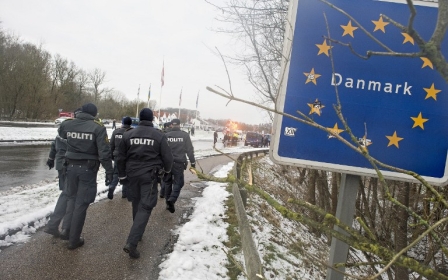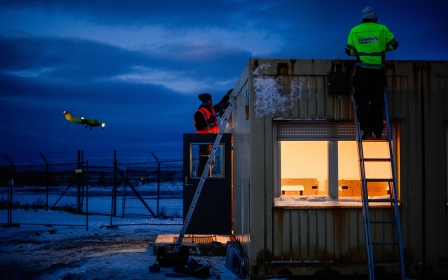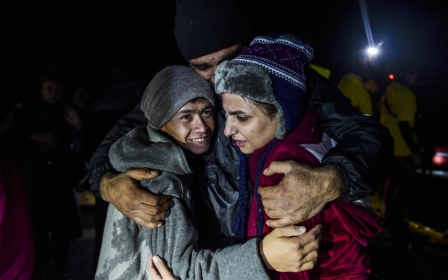Danish parliament approves 'cruel' changes to refugees law

Denmark's parliament on Tuesday voted emphatically in favour of draconian reforms curbing the rights of asylum seekers, including delaying family reunifications and confiscating refugees' valuables under legislation that has provoked widespread condemnation.
The bill presented by the right-wing minority government of Prime Minister Lars Lokke Rasmussen was approved by 81 of the 109 members of parliament present, as members of the opposition Social Democrats backed the measures.
The government insists the new law is needed to stem the flow of refugees even though Denmark and Sweden recently tightened their borders, a move that prompted Germany and Austria to turn back new arrivals heading for Scandinavia.
"There's no simple answer for a single country, but until the world comes together on a joint solution [to the migrant crisis], Denmark needs to act," Jakob Ellemann-Jensen of Rasmussen's Venstre party said during the debate.
Social Democrat Dan Jorgensen addressed opponents of the bill, demanding: "To those saying what we are doing is wrong, my question is: What is your alternative?
"The alternative is that we continue to be one of the most attractive countries in Europe to come to, and then we end up like Sweden."
Copenhagen has often referred to neighbouring Sweden as a bad example, where 163,000 asylum applications were submitted last year; five times more than in Denmark, relative to their population size.
But the measures have been widely condemned by international organisations including the United Nations refugee agency, which says they violate several conventions on rights and refugees, and the Council of Europe.
While international outrage has focused on a proposal allowing police to seize cash and valuables from refugees to help pay for their stay in asylum centres, rights activists have raised concerns about the introduction of a three-year delay for family reunifications which they say breaches international conventions.
"I'm afraid that it will lead to an incentive structure where refugees bring their children with them," Mette Gjerskov, a Social Democrat who said he would vote against his own party, told the Berlingske newspaper.
"We have seen plenty of children in rubber boats on the Mediterranean," she added.
Human rights organisation Amnesty International also said that the new law would have a "devastating impact on vulnerable people" and raised particular concerns over rules requiring "war refugees" to wait for three years before being eligible to apply for family reunification.
"It’s simply cruel to force people who are running from conflicts to make an impossible choice: either bring children and other loved ones on dangerous, even lethal journeys, or leave them behind and face a prolonged separation while they continue to suffer the horrors of war," said Gauri van Gulik, Amnesty International’s Deputy Director for Europe.
Others have drawn parallels between the Danish proposals and the confiscation of gold and other valuables from Jews by the Nazis during the Holocaust.
"It is very alarming. They are moving towards a very totalitarian understanding of how we should treat human beings," Imran Shah, a spokesperson for the Islamic Society of Denmark, told Middle East Eye earlier this month.
"We are talking about something that happened in a very dark chapter of European history and it seems as if the lessons of history are not enough for the Danish politicians.
"It is a tendency that I would call fascist and it is quite destructive for the coherence of society."
Rasmussen had shrugged off the criticism, calling it "the most misunderstood bill in Denmark's history," seemingly more concerned with opinion polls showing that 70 percent of Danes rank immigration as their top political concern.
"Rasmussen has to be elected in Denmark... not the international media," Bjarne Steensbeck, a political commentator at public broadcaster DR, told the AFP news agency.
The minority government eventually backtracked on parts of the plan to confiscate migrants' valuables in order to secure backing for the bill from two small right-wing parties and the opposition Social Democrats.
Asylum seekers will now have to hand over cash exceeding 10,000 kroner ($1,450) and any individual items valued at more than that amount.
After thorny negotiations with the other parties, Inger Stojberg, Denmark's immigration minister, agreed to make wedding rings and other items of sentimental value exempt.
The government has defended the move by arguing that Danes who want to qualify for social benefits may also have to sell their valuables.
However, they are not subjected to the kind of searches proposed in the new asylum law.
Once a champion of refugee rights, the Scandinavian country's goal is now to become "significantly less attractive for asylum-seekers," Stojberg said.
"The tone in the public debate about refugees and immigrants has undoubtedly become tougher," Kashif Ahmad, the leader of the National Party, which hopes to enter parliament by targeting the immigrant vote, told AFP.
Home to 5.6 million people, Denmark registered 21,000 asylum applications in 2015, making it one of the top EU destinations per capita for migrants but putting it far behind the 163,000 registered in Sweden.
In a January 15 letter to Stojberg, the Council of Europe's commissioner for human rights, Nils Muiznieks, said the family reunifications proposal raised "issues of compatibility" with the European Convention on Human Rights.
Rasmussen, whose party won a June 2015 election after promising an "immediate slowdown" of Denmark's refugee influx, has been unfazed, arguing that the UN Refugee Convention may need to be changed if refugees keep pouring into Europe.
Kristian Jensen, the Danish foreign minister, defended the new law last week as he appeared before the United Nations for a review of Denmark's rights policies.
"The Danish welfare state is based upon the very simple principle that the state will provide and pay for those unable to take care of themselves, not for those who are able," he told the Human Rights Council.
He and Stojberg reiterated the same line as they faced questioning from European MPs in the civil liberties committee on Monday.
Rasmussen said earlier in January that his government did not wish the country to become a "new major destination for refugees" and has since introduced tighter border controls at its frontiers with neighbouring Germany and Sweden as millions of refugees from countries such as Syria, Iraq and Libya have sought safety and new lives in Europe.
Last year the country posted Arabic language advertisements in Lebanese newspapers discouraging migrants and asylum seekers from attempting to reach the country.
New MEE newsletter: Jerusalem Dispatch
Sign up to get the latest insights and analysis on Israel-Palestine, alongside Turkey Unpacked and other MEE newsletters
Middle East Eye delivers independent and unrivalled coverage and analysis of the Middle East, North Africa and beyond. To learn more about republishing this content and the associated fees, please fill out this form. More about MEE can be found here.




